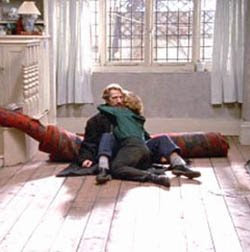Anthony Minghella, R.I.P.

I logged onto the Internet five minutes ago, and was shocked to read of the death of Anthony Minghella, a director whose work I'd long admired, and who brought a quiet grace and melancholy to almost every film he made. Reports say he died in a London hospital of a hemorrhage following neck surgery. He was 54.
As his career developed, he became known for large prestige pictures like Cold Mountain and The English Patient, for which he won an Oscar. But I will always treasure the smaller moments and more difficult emotions he explored in films like The Talented Mr. Ripley and Truly, Madly, Deeply. Has anyone ever used the considerable gifts of Jude Law and Alan Rickman so well?
The Talented Mr. Ripley is one of the most alluringly sensual and decadent mainstream films of the last decade, offering us an Italian playground full of sharply cut fashions, glittering beaches and almost fetishized Vespas, all set to mid-50s jazz. This emphasis on mise-en-scene is essential for putting us in the shoes of Matt Damon's Tom Ripley: for all the film's violence and emotional darkness, I'm sure I wasn't the only person who longed to escape into the screen. At the center of the playground is the film's largest fetish object: Jude Law. Minghella found the cold center of Law beneath the beautiful exterior, and fully tapped that complex mixture of selfishness and charm, neediness and arrogance that the actor exudes (he also gave Philip Seymour Hoffman a breakthrough supporting role, and pulled out very fine performances from Damon and Gwyneth Paltrow). In doing so, he made us complicit in the moral compromises the film explores: I woudn't necessarily disagree with Anthony Lane, who said that Law might have been more fruitfully cast as RIpley than as Dickie, but the offbeat casting choices make the ethical questions that much more interesting: in the end, who's the real "bad guy" in this story, anyway?
Truly, Madly, Deeply asks the same questions, but does so through the form of the romantic comedy. The obvious relation is Ghost, which tells a similar tale of a beloved husband's return from the dead, and a comparison of the latter's hokey comedy and melodramatic staging with Deeply's low-key approach is fruitful. The better comparisons, though, might be with the rest of Alan Rickman's screen work. So often cast as a villain, a cad, or a charming anti-hero, Rickman here is wonderfully gentle, sweet and funny; Minghella allows him a range of emotions the actor didn't always get in his supporting roles in blockbusters, and also pairs him with Juliet Stevenson (a pairing that further suggests how far this is from the himboverse of Ghost), whose shrugged shoulders, quietly dry line readings and vulnerability-longing-to-break-through-the-calm work so nicely with Rickman's vinegar timbre. Rickman is much more the romantic hero here than in nearly anything else (except, perhaps, Sense and Sensibility), but that doesn't mean he's not also prickly, selfish, and frustrating as hell.
It sometimes got lost in his larger historical work, but this kind of emotional complexity was a hallmark of Minghella's best work as a director and producer (in the latter capacity he co-produced films like Iris, The Quiet American and Michael Clayton). Before working in film, television and theater, Minghella worked as a University professor, and that discipline's combination of critical eye and sympathy for the subject served him well: his films were not afraid to pitilessly expose a character's hypocrisies (as in The English Patient) while still maintaining a basic acknowlegment of everyone's humanity (The title Truly, Madly, Deeply might have been the best one-line summation of his style and perspective). That we won't get to see more examples of this sort of thoughtful, adult generosity from Minghella is a horrible loss.
Glenn Kenny has more here, and I'm sure there will be more in the blogosphere soon.
UPDATE: Bob writes of Minghella here, Kim Morgan has a nice remembrance and some links, and the NY Times obit is here.
UPDATE #2 (11:50 p.m.): Not a big thing, but I should've noted that, in addition to his talents as a director and producer, Minghella was also a talented writer, writing several plays, and the scripts for all six of his features. And I didn't realize, until I read it in an Amazon blog, that Minghella made a cameo in last year's Atonement, as the man who interviews Vanessa Redgrave. I just saw and enjoyed Atonement, and will write more about it soon, but it seems apt that Minghella appears, as if giving this knotty, complex cinematic child of films like The English Patient and Truly, Madly, Deeply his blessing.


Comments
Oh, the movies he would have made.
And I think you kind of nailed just why "Mr. Ripley" works so well -- it's really a film about the ultimate unrequited love, complicated the fact that the sociopath, if Minghella's Ripley is really that, is more sympathetic than the victim (if you're so spoiled that you have very little empathy, is that the same thing as being a sociopath?) I guess that's what Lane was complaining about. But I'm convinced that casting the other way around would have ruined the film. As underrated an actor as he is, Law's coolness would have had us pegging him as a simple villain from the start. Damon's much better at projecting vulnerability and I think that's crucial in Minghella's approach to implicating the audience.
And it sure was gorgeous, isn't it. (It was one of the first DVDs I bought, from a used bargain bin but still.)
You're probably right: that unexpected casting does enhance and prolong the suspense. And it was one of the first films I got on DVD, too.
Boolise,
I know-- so sad. I'd forgotten the dialogue from that moment, actually, so I thank you for the reminder.